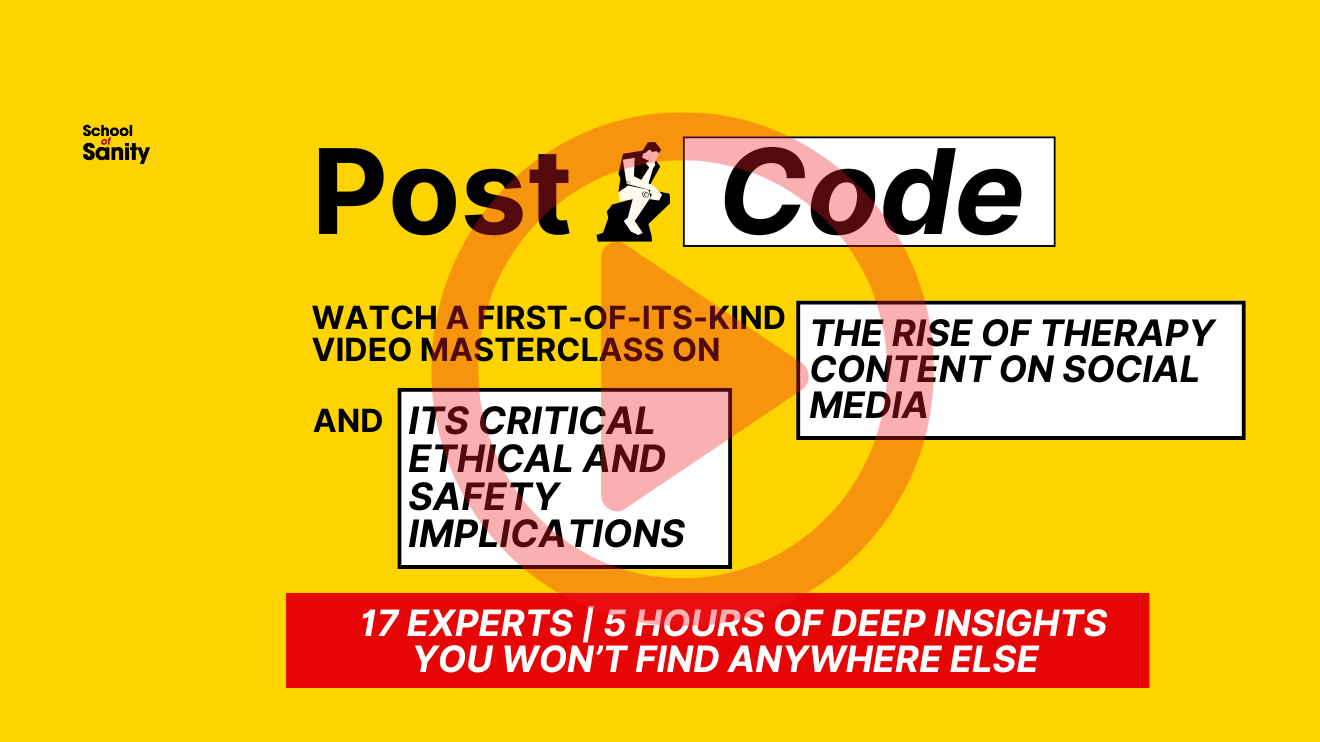▶️ MASTERCLASS | The gung-ho rise of therapy content on social media, and the ethics of therapist-content creators/-influencers
One of the most meaningful things I've ever built.

💡
What viewers say about this 5-hour masterclass
"I feel reaffirmed that we may be entrenched in an algorithmic ecosystem, but we can use our agency to make a difference in the field of mental health in an ethical way." - SAUMYA SHRIWAR
"I think I was both touched and transformed a little today, towards my aspirational therapist self who is a human first." - SANJIVANI JHA
"This will stay with me for years to come and will not only help me become a better professional but also help me revisit my own beliefs and values as they grow and evolve." - NEHA BANIK
"I feel reaffirmed that we may be entrenched in an algorithmic ecosystem, but we can use our agency to make a difference in the field of mental health in an ethical way." - SAUMYA SHRIWAR
"I think I was both touched and transformed a little today, towards my aspirational therapist self who is a human first." - SANJIVANI JHA
"This will stay with me for years to come and will not only help me become a better professional but also help me revisit my own beliefs and values as they grow and evolve." - NEHA BANIK
I've put together this first-of-its-kind video masterclass where 17 experts from psychotherapy, content creation, peer support, technology, and the media demystify the complex intersection of therapy and social media.
They take on vital questions that directly impact a therapist's career, their personal and professional identities, as well as the safety and welfare of patients and caregivers.
This is critical stuff that they don't teach you in school. Stuff that anyone with any stake in the future of mental health conversations ought to make time for.
Why this matters
Therapists are turning influencers on social media in unprecedented numbers. While this trend has helped destigmatise taboo topics and bring much deserved attention to the critical care work therapists perform in society, it has also raised several thorny ethical questions that are largely ignored in academic and professional circles. Questions such as:
- Are professionals being trained enough to investigate why they are on social media in the first place? Is it for self-expression, helping the public, or getting appreciation for their thoughts?
- What are the boundaries of self-disclosure online for therapists
- What kind of fantasies might a therapist's social media feed, their projected personality, create in the mind of a patient/prospective patient/caregiver, and how might that impact the viability of the therapeutic relationship?
- The trend of sharing patient stories for the sake of knowledge creation – can this ever be kosher, even with consent?
- What is the impact of the proliferation of trauma content on how laypeople perceive therapy?
- Are therapists talking enough about actual, concrete outcomes from therapy? About how therapy can help you regain a sense of agency, autonomy, and joy in a broken world?
- What kind of therapy content do patients and caregivers really need right now? How should therapists listen better to these needs
- What tools do therapists need to become effective content creators? What myths about the role social media can play in their careers do we need to bust?



💡
More reasons to dig into this masterclass from those who've already watched it
"It was so inviting and gratifying as a space that allowed me to not feel like I was getting left behind in this Therapy and Social Media and AI twilight zone. I feel so grateful to have found the encouragement to go slow and really question what my online presence means." - PRATIKSHA TEWARI
"What I loved about this was the depth of dialogue, the integrity of the curation, and the quality of (most of) the conversations, all of which created a space that felt both intellectually nourishing and emotionally grounding. Every session I could attend invited me not just to think, but to feel, and to do so in community. I'm walking away not just with ideas, but with a renewed sense of connection and purpose in how I show up on social media as a therapist." - PRIYANKA BAJARIA
"A gathering of minds and hearts who care deeply about how we show up in the digital world as mental health practitioners. The space felt thoughtfully held, gentle, curious, and refreshingly honest. What struck me the most was how the discussions didn’t shy away from complexity. I walked away with more clarity, but also with more curiosity and to me, that’s the mark of a truly meaningful experience." - RASHMI JAYASHANKAR
"It was so inviting and gratifying as a space that allowed me to not feel like I was getting left behind in this Therapy and Social Media and AI twilight zone. I feel so grateful to have found the encouragement to go slow and really question what my online presence means." - PRATIKSHA TEWARI
"What I loved about this was the depth of dialogue, the integrity of the curation, and the quality of (most of) the conversations, all of which created a space that felt both intellectually nourishing and emotionally grounding. Every session I could attend invited me not just to think, but to feel, and to do so in community. I'm walking away not just with ideas, but with a renewed sense of connection and purpose in how I show up on social media as a therapist." - PRIYANKA BAJARIA
"A gathering of minds and hearts who care deeply about how we show up in the digital world as mental health practitioners. The space felt thoughtfully held, gentle, curious, and refreshingly honest. What struck me the most was how the discussions didn’t shy away from complexity. I walked away with more clarity, but also with more curiosity and to me, that’s the mark of a truly meaningful experience." - RASHMI JAYASHANKAR
Learn more about PostCode, originally streamed live on April 12, here.





